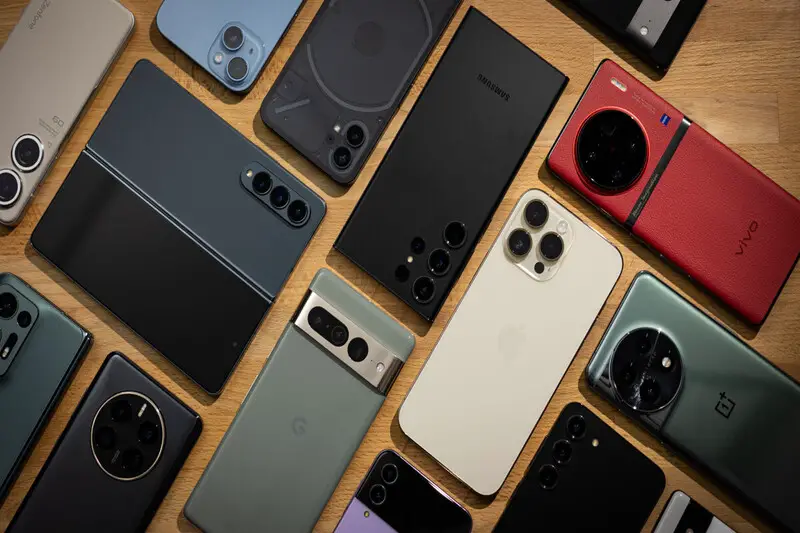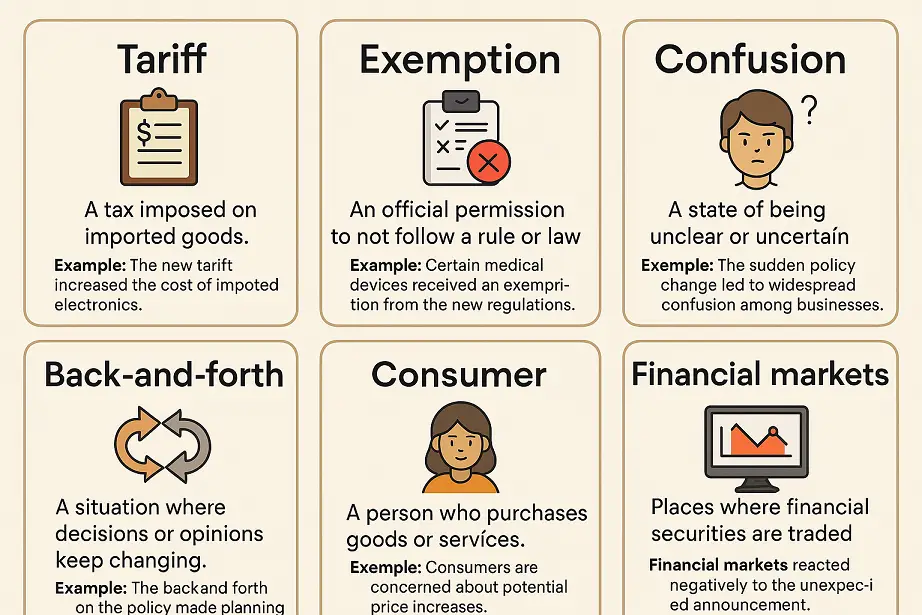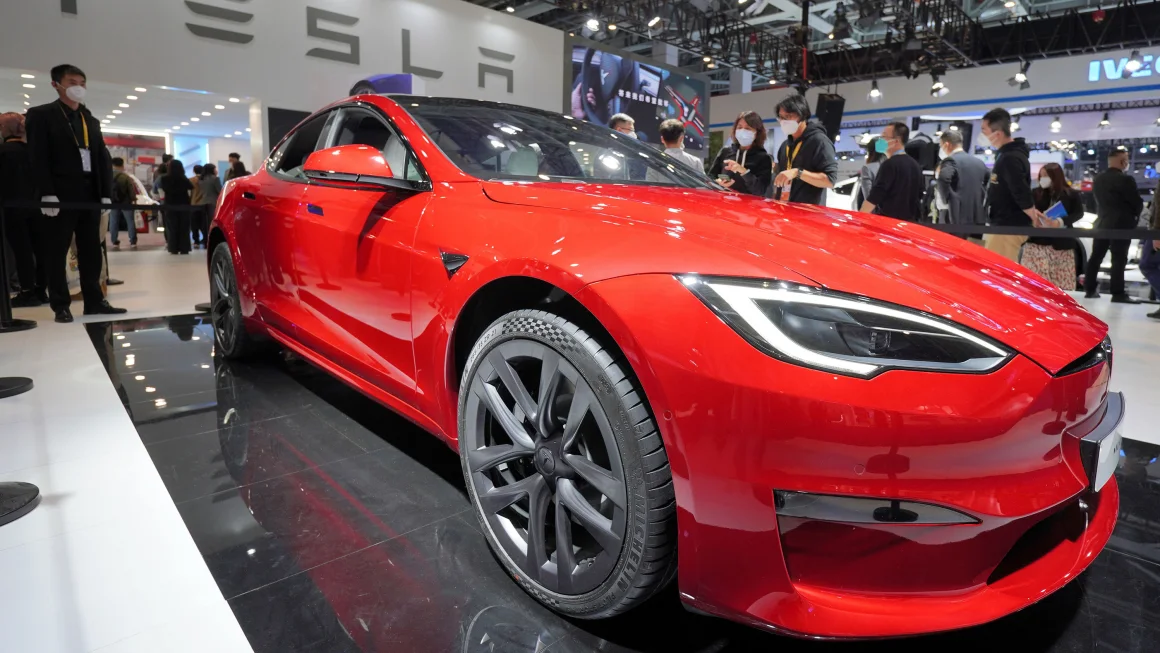Today’s topic is a surprising twist in U.S.-China trade relations.
In April 2025, President Trump announced that electronics like smartphones and laptops would be exempt from new tariffs on Chinese imports. Tech companies and consumers felt relieved.
But just hours later, the administration clarified that these products would still face a 20% tariff under a different policy aimed at pressuring China over fentanyl.
This sudden reversal created confusion across the tech industry and financial markets.
In today’s episode, you’ll hear a dialogue between Anna and Ben as they react to this news, share their thoughts, and explore the possible impact on everyday life.
Let’s dive into what happened – and what it means for companies, consumers, and the global economy.

CONVERSATION
Anna:
Hey Ben, did you see the news about the tariffs on electronics? Things are getting a bit crazy again.
Ben:
Oh yeah, I did! First, they said smartphones and laptops would be exempt, and then just a few hours later—bam! A 20% tariff under a different category. What’s going on?
Anna:
Exactly. It’s like a complete U-turn. A lot of companies were relieved at first, thinking they’d been spared. And then… confusion everywhere.
Ben:
Yeah, I read that the exemptions were supposed to help reduce the impact on consumers. I mean, no one wants to pay more for a phone or a laptop, right?
Anna:
Right! Especially now when people depend so much on their devices for school, work, and even daily life. If prices go up, that could hit a lot of people hard.
Ben:
And let’s not forget the tech companies. I bet Apple, Dell, and others had already started planning around the exemption. Then suddenly, they’re back to square one.
Anna:
Exactly! I saw someone online say this kind of mixed messaging makes it really hard to do business. How can companies make smart decisions when policies keep changing?
Ben:
Totally. And the reason they gave this time was related to fentanyl policy. It seems like the administration is using trade tools to apply pressure on China for unrelated issues.
Anna:
Yeah, and that’s a bit risky. Mixing economic policy with drug enforcement can complicate things even more.
Ben:
Agreed. And from what I read, markets reacted badly too. Stocks dropped because investors hate uncertainty.
Anna:
Makes sense. Stability is key in the business world. When things change overnight, it creates panic.
Ben:
Exactly. And what’s really interesting is how much power one announcement can have. A short statement from the President and the whole tech industry reacts instantly.
Anna:
True. It shows how connected everything is—politics, economics, technology. One decision can cause a ripple effect across the globe.
Ben:
And it’s not just about gadgets. It’s also about jobs, supply chains, shipping costs… all of that can be affected.
Anna:
Absolutely. If companies need to pay more for imported parts, they’ll either raise prices or cut costs somewhere—maybe by reducing jobs or moving production.
Ben:
Right. It’s a chain reaction. Also, I was thinking—what about small businesses? They might not survive such sudden price jumps.
Anna:
Good point. A big company like Apple might absorb some of the costs, but smaller businesses probably can’t. It’s definitely a tough spot.
Ben:
So what do you think will happen next?
Anna:
Hard to say. Maybe there’ll be another policy shift. Or maybe companies will try to move production out of China to avoid tariffs altogether.
Ben:
That’s already happening, I think. Vietnam, India, and Mexico are becoming popular alternatives.
Anna:
But moving factories isn’t easy or cheap. It takes time, planning, and a lot of money.
Ben:
Yeah, and even then, you still have to deal with new rules and challenges in those countries.
Anna:
So basically, there’s no quick fix. Just a lot of uncertainty.
Ben:
Exactly. And for us as consumers, we’ll probably just see higher prices and fewer choices for a while.
Anna:
I guess now’s a good time to buy a new laptop before things get worse!
Ben:
Haha, good idea! Or maybe I’ll just hold on to my old one and hope it lasts another year.
Anna:
Same here. Well, let’s hope things settle down soon—for everyone’s sake.
Ben:
Fingers crossed. Thanks for chatting, Anna. This was really interesting.
Anna:
Always a pleasure, Ben!
Vocabulary List

-
Tariff
-
Definition: A tax imposed on imported goods.
-
Example: The new tariff increased the cost of imported electronics.
-
-
Exemption
-
Definition: An official permission to not follow a rule or law.
-
Example: Certain medical devices received an exemption from the new regulations.
-
-
Confusion
-
Definition: A state of being unclear or uncertain.
-
Example: The sudden policy change led to widespread confusion among businesses.
-
-
Back-and-forth
-
Definition: A situation where decisions or opinions keep changing.
-
Example: The back-and-forth on the policy made planning difficult.
-
-
Consumer
-
Definition: A person who purchases goods or services.
-
Example: Consumers are concerned about potential price increases.
-
-
Financial markets
-
Definition: Places where financial securities are traded.
-
Example: Financial markets reacted negatively to the unexpected announcement.
-
Today’s topic is all about Tesla, China, and the impact of global tariffs.
Recently, Tesla has decided to stop selling two of its high-end models, the Model S and Model X, in China.
Why?
Because of rising trade tensions between the United States and China.
The U.S. has imposed a 145% tariff on Chinese electric vehicles, and China responded with a 125% tariff on American imports.
This trade war has made it too expensive for Tesla to sell some of its cars in China.
In today’s episode, you’ll hear a dialogue between Anna and Ben, as they dive into this issue, share their thoughts, and explore what this means for the future of global business.
Make sure to stay until the end, because we’ll also break down some useful vocabulary and phrases from the conversation.
Let’s get started!

CONVERSATION
Anna:
Hey Ben, have you read the latest news about Tesla pulling some of its cars from the Chinese market?
Ben:
Yeah, I caught that on CNN. They stopped selling the Model S and Model X in China, right?
Anna:
Exactly. It’s all because of the new tariffs between the U.S. and China. The U.S. slapped a 145% tariff on Chinese imports, and China hit back with a 125% tariff on American goods, including electric vehicles.
Ben:
That’s pretty brutal. So basically, the cost of importing American-made Teslas into China just skyrocketed?
Anna:
Yup. That made the Model S and Model X way too expensive for Chinese consumers. It’s hard to compete when your price jumps by over 100%.
Ben:
Totally. And what makes it even trickier is that Tesla has a Gigafactory in Shanghai. So the locally-made Model 3 and Model Y are much cheaper and don’t face the same tariffs.
Anna:
Exactly. It’s a smart move, honestly. But it also shows how vulnerable companies are to geopolitical decisions.
Ben:
True. Elon Musk even criticized the U.S. government. He said the tariffs are hurting American businesses, not helping them.
Anna:
He has a point. A trade war might seem tough on paper, but it ends up being bad for businesses on both sides. Plus, it confuses consumers.
Ben:
And the global supply chain gets even messier. I read somewhere that companies are now rethinking where they manufacture products, just to avoid high tariffs.
Anna:
Yeah, that’s called “supply chain diversification.” Companies are starting to build factories in other countries like Vietnam, India, and Mexico to spread out the risk.
Ben:
That’s smart. But isn’t it expensive to relocate production?
Anna:
Definitely. But for big players like Tesla, it might be cheaper in the long run than paying huge tariffs or losing market share.
Ben:
Good point. I wonder how Chinese consumers feel about this. Do you think they’ll switch to local EV brands?
Anna:
Actually, many already have. Chinese brands like BYD and Nio are growing fast. They offer high-tech features at competitive prices, and now they have a price advantage too.
Ben:
Wow. So Tesla’s losing market share in China?
Anna:
It looks that way. China is the world’s largest EV market, so this could have long-term effects on Tesla’s global position.
Ben:
Do you think this will push Tesla to produce more models locally in China?
Anna:
Maybe. Local production helps them avoid tariffs and stay competitive. But it also raises concerns about intellectual property and technology transfer.
Ben:
True. Some U.S. companies are worried that manufacturing in China could lead to copycat products.
Anna:
It’s a delicate balance. You want access to a massive market, but you don’t want to lose your edge.
Ben:
Exactly. I just hope both governments can work things out. A prolonged trade war helps no one.
Anna:
Totally agree. Meanwhile, for consumers like us, it just means fewer choices and higher prices.
Ben:
Yikes. So much for my dream of getting a Model S in the future!
Anna:
Haha, maybe wait until they sort out the tariffs—or move to Shanghai!
Vocabulary List – Tesla, Tariffs & Trade

1. Tariff (noun)
Meaning: A tax placed on imported or exported goods
Example: China imposed new tariffs on electric vehicles from the U.S.”
2. Supply chain (noun)
Meaning: The entire system of producing and delivering a product, from suppliers to customers
Example: Tesla may have to change its supply chain to avoid tariffs.”
3. Trade war (noun)
Meaning: A conflict between countries where each side imposes tariffs or restrictions on the other’s goods
Example: The trade war between the U.S. and China has affected many global companies.”
4. Manufacturing hub (noun)
Meaning: A central location where many goods are produced
Example: China is a major manufacturing hub for electric vehicles.
5. Relocate (verb)
Meaning: To move to a different place
Example: Some companies are relocating their factories to Vietnam.
6. Market share (noun)
Meaning: The portion of sales a company has in a particular market
Example: Tesla is trying to increase its market share in Asia.
7. Geopolitical tension (noun phrase)
Meaning: Political conflict between countries that affects international relations
Example: Geopolitical tensions can lead to higher tariffs and supply chain issues.
8. Export (verb/noun)
Meaning: To send goods to another country for sale
Example: Tesla exports cars from China to other parts of the world.
9. Diversify (verb)
Meaning: To vary or expand the range of something (like markets or suppliers)
Example: Tesla wants to diversify its supply chain to reduce risks.”
10. Uncertainty (noun)
Meaning: A situation where outcomes are unknown or unpredictable
Example: Economic uncertainty is making companies rethink their global strategies.”
11. Tense (adjective)
Meaning: Nervous or difficult, usually describing a situation or relationship
Example: Relations between the U.S. and China have become tense again.”
12. Investment (noun)
Meaning: Money put into something to gain profit or benefit
Example: Tesla has made large investments in its Shanghai factory.”